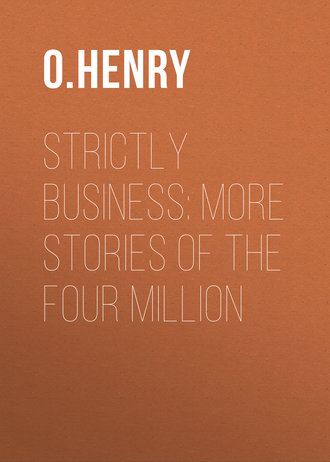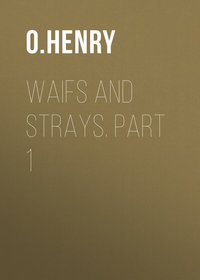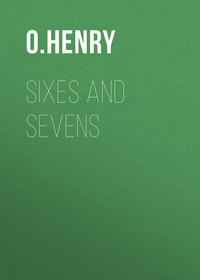 полная версия
полная версияStrictly Business: More Stories of the Four Million
The weight of learning was no handicap to Dabster. His statistics were the sprigs of parsley with which he garnished the feast of small talk that he would set before you if he conceived that to be your taste. And again he used them as breastworks in foraging at the boardinghouse. Firing at you a volley of figures concerning the weight of a lineal foot of bar-iron 5 × 2¾ inches, and the average annual rainfall at Fort Snelling, Minn., he would transfix with his fork the best piece of chicken on the dish while you were trying to rally sufficiently to ask him weakly why does a hen cross the road.
Thus, brightly armed, and further equipped with a measure of good looks, of a hair-oily, shopping-district-at-three-in-the-afternoon kind, it seems that Joe, of the Lilliputian emporium, had a rival worthy of his steel. But Joe carried no steel. There wouldn't have been room in his store to draw it if he had.
One Saturday afternoon, about four o'clock, Daisy and Mr. Dabster stopped before Joe's booth. Dabster wore a silk hat, and – well, Daisy was a woman, and that hat had no chance to get back in its box until Joe had seen it. A stick of pineapple chewing gum was the ostensible object of the call. Joe supplied it through the open side of his store. He did not pale or falter at sight of the hat.
"Mr. Dabster's going to take me on top of the building to observe the view," said Daisy, after she had introduced her admirers. "I never was on a skyscraper. I guess it must be awfully nice and funny up there."
"H'm!" said Joe.
"The panorama," said Mr. Dabster, "exposed to the gaze from the top of a lofty building is not only sublime, but instructive. Miss Daisy has a decided pleasure in store for her."
"It's windy up there, too, as well as here," said Joe. "Are you dressed warm enough, Daise?"
"Sure thing! I'm all lined," said Daisy, smiling slyly at his clouded brow. "You look just like a mummy in a case, Joe. Ain't you just put in an invoice of a pint of peanuts or another apple? Your stock looks awful over-stocked."
Daisy giggled at her favorite joke; and Joe had to smile with her.
"Your quarters are somewhat limited, Mr. – er – er," remarked Dabster, "in comparison with the size of this building. I understand the area of its side to be about 340 by 100 feet. That would make you occupy a proportionate space as if half of Beloochistan were placed upon a territory as large as the United States east of the Rocky Mountains, with the Province of Ontario and Belgium added."
"Is that so, sport?" said Joe, genially. "You are Weisenheimer on figures, all right. How many square pounds of baled hay do you think a jackass could eat if he stopped brayin' long enough to keep still a minute and five eighths?"
A few minutes later Daisy and Mr. Dabster stepped from an elevator to the top floor of the skyscraper. Then up a short, steep stairway and out upon the roof. Dabster led her to the parapet so she could look down at the black dots moving in the street below.
"What are they?" she asked, trembling. She had never been on a height like this before.
And then Dabster must needs play the philosopher on the tower, and conduct her soul forth to meet the immensity of space.
"Bipeds," he said, solemnly. "See what they become even at the small elevation of 340 feet – mere crawling insects going to and fro at random."
"Oh, they ain't anything of the kind," exclaimed Daisy, suddenly – "they're folks! I saw an automobile. Oh, gee! are we that high up?"
"Walk over this way," said Dabster.
He showed her the great city lying like an orderly array of toys far below, starred here and there, early as it was, by the first beacon lights of the winter afternoon. And then the bay and sea to the south and east vanishing mysteriously into the sky.
"I don't like it," declared Daisy, with troubled blue eyes. "Say we go down."
But the philosopher was not to be denied his opportunity. He would let her behold the grandeur of his mind, the half-nelson he had on the infinite, and the memory he had for statistics. And then she would nevermore be content to buy chewing gum at the smallest store in New York. And so he began to prate of the smallness of human affairs, and how that even so slight a removal from earth made man and his works look like one tenth part of a dollar thrice computed. And that one should consider the sidereal system and the maxims of Epictetus and be comforted.
"You don't carry me with you," said Daisy. "Say, I think it's awful to be up so high that folks look like fleas. One of them we saw might have been Joe. Why, Jiminy! we might as well be in New Jersey! Say, I'm afraid up here!"
The philosopher smiled fatuously.
"The earth," said he, "is itself only as a grain of wheat in space. Look up there."
Daisy gazed upward apprehensively. The short day was spent and the stars were coming out above.
"Yonder star," said Dabster, "is Venus, the evening star. She is 66,000,000 miles from the sun."
"Fudge!" said Daisy, with a brief flash of spirit, "where do you think I come from – Brooklyn? Susie Price, in our store – her brother sent her a ticket to go to San Francisco – that's only three thousand miles."
The philosopher smiled indulgently.
"Our world," he said, "is 91,000,000 miles from the sun. There are eighteen stars of the first magnitude that are 211,000 times further from us than the sun is. If one of them should be extinguished it would be three years before we would see its light go out. There are six thousand stars of the sixth magnitude. It takes thirty-six years for the light of one of them to reach the earth. With an eighteen-foot telescope we can see 43,000,000 stars, including those of the thirteenth magnitude, whose light takes 2,700 years to reach us. Each of these stars – "
"You're lyin'," cried Daisy, angrily. "You're tryin' to scare me. And you have; I want to go down!"
She stamped her foot.
"Arcturus – " began the philosopher, soothingly, but he was interrupted by a demonstration out of the vastness of the nature that he was endeavoring to portray with his memory instead of his heart. For to the heart-expounder of nature the stars were set in the firmament expressly to give soft light to lovers wandering happily beneath them; and if you stand tiptoe some September night with your sweetheart on your arm you can almost touch them with your hand. Three years for their light to reach us, indeed!
Out of the west leaped a meteor, lighting the roof of the skyscraper almost to midday. Its fiery parabola was limned against the sky toward the east. It hissed as it went, and Daisy screamed.
"Take me down," she cried, vehemently, "you – you mental arithmetic!"
Dabster got her to the elevator, and inside of it. She was wild-eyed, and she shuddered when the express made its debilitating drop.
Outside the revolving door of the skyscraper the philosopher lost her. She vanished; and he stood, bewildered, without figures or statistics to aid him.
Joe had a lull in trade, and by squirming among his stock succeeded in lighting a cigarette and getting one cold foot against the attenuated stove.
The door was burst open, and Daisy, laughing, crying, scattering fruit and candies, tumbled into his arms.
"Oh, Joe, I've been up on the skyscraper. Ain't it cozy and warm and homelike in here! I'm ready for you, Joe, whenever you want me."
XV
A BIRD OF BAGDAD
Without a doubt much of the spirit and genius of the Caliph Harun Al Rashid descended to the Margrave August Michael von Paulsen Quigg.
Quigg's restaurant is in Fourth Avenue – that street that the city seems to have forgotten in its growth. Fourth Avenue – born and bred in the Bowery – staggers northward full of good resolutions.
Where it crosses Fourteenth Street it struts for a brief moment proudly in the glare of the museums and cheap theatres. It may yet become a fit mate for its high-born sister boulevard to the west, or its roaring, polyglot, broad-waisted cousin to the east. It passes Union Square; and here the hoofs of the dray horses seem to thunder in unison, recalling the tread of marching hosts – Hooray! But now come the silent and terrible mountains – buildings square as forts, high as the clouds, shutting out the sky, where thousands of slaves bend over desks all day. On the ground floors are only little fruit shops and laundries and book shops, where you see copies of "Littell's Living Age" and G. W. M. Reynold's novels in the windows. And next – poor Fourth Avenue! – the street glides into a mediaeval solitude. On each side are shops devoted to "Antiques."
Let us say it is night. Men in rusty armor stand in the windows and menace the hurrying cars with raised, rusty iron gauntlets. Hauberks and helms, blunderbusses, Cromwellian breastplates, matchlocks, creeses, and the swords and daggers of an army of dead-and-gone gallants gleam dully in the ghostly light. Here and there from a corner saloon (lit with Jack-o'-lanterns or phosphorus), stagger forth shuddering, home-bound citizens, nerved by the tankards within to their fearsome journey adown that eldrich avenue lined with the bloodstained weapons of the fighting dead. What street could live inclosed by these mortuary relics, and trod by these spectral citizens in whose sunken hearts scarce one good whoop or tra-la-la remained?
Not Fourth Avenue. Not after the tinsel but enlivening glories of the Little Rialto – not after the echoing drum-beats of Union Square. There need be no tears, ladies and gentlemen; 'tis but the suicide of a street. With a shriek and a crash Fourth Avenue dives headlong into the tunnel at Thirty-fourth and is never seen again.
Near the sad scene of the thoroughfare's dissolution stood the modest restaurant of Quigg. It stands there yet if you care to view its crumbling red-brick front, its show window heaped with oranges, tomatoes, layer cakes, pies, canned asparagus – its papier-mâché lobster and two Maltese kittens asleep on a bunch of lettuce – if you care to sit at one of the little tables upon whose cloth has been traced in the yellowest of coffee stains the trail of the Japanese advance – to sit there with one eye on your umbrella and the other upon the bogus bottle from which you drop the counterfeit sauce foisted upon us by the cursed charlatan who assumes to be our dear old lord and friend, the "Nobleman in India."
Quigg's title came through his mother. One of her ancestors was a Margravine of Saxony. His father was a Tammany brave. On account of the dilution of his heredity he found that he could neither become a reigning potentate nor get a job in the City Hall. So he opened a restaurant. He was a man full of thought and reading. The business gave him a living, though he gave it little attention. One side of his house bequeathed to him a poetic and romantic adventure. The other gave him the restless spirit that made him seek adventure. By day he was Quigg, the restaurateur. By night he was the Margrave – the Caliph – the Prince of Bohemia – going about the city in search of the odd, the mysterious, the inexplicable, the recondite.
One night at 9, at which hour the restaurant closed, Quigg set forth upon his quest. There was a mingling of the foreign, the military and the artistic in his appearance as he buttoned his coat high up under his short-trimmed brown and gray beard and turned westward toward the more central life conduits of the city. In his pocket he had stored an assortment of cards, written upon, without which he never stirred out of doors. Each of those cards was good at his own restaurant for its face value. Some called simply for a bowl of soup or sandwiches and coffee; others entitled their bearer to one, two, three or more days of full meals; a few were for single regular meals; a very few were, in effect, meal tickets good for a week.
Of riches and power Margrave Quigg had none; but he had a Caliph's heart – it may be forgiven him if his head fell short of the measure of Harun Al Rashid's. Perhaps some of the gold pieces in Bagdad had put less warmth and hope into the complainants among the bazaars than had Quigg's beef stew among the fishermen and one-eyed calenders of Manhattan.
Continuing his progress in search of romance to divert him, or of distress that he might aid, Quigg became aware of a fast-gathering crowd that whooped and fought and eddied at a corner of Broadway and the crosstown street that he was traversing. Hurrying to the spot he beheld a young man of an exceedingly melancholy and preoccupied demeanor engaged in the pastime of casting silver money from his pockets in the middle of the street. With each motion of the generous one's hand the crowd huddled upon the falling largesse with yells of joy. Traffic was suspended. A policeman in the centre of the mob stooped often to the ground as he urged the blockaders to move on.
The Margrave saw at a glance that here was food for his hunger after knowledge concerning abnormal working of the human heart. He made his way swiftly to the young man's side and took his arm. "Come with me at once," he said, in the low but commanding voice that his waiters had learned to fear.
"Pinched," remarked the young man, looking up at him with expressionless eyes. "Pinched by a painless dentist. Take me away, flatty, and give me gas. Some lay eggs and some lay none. When is a hen?"
Still deeply seized by some inward grief, but tractable, he allowed Quigg to lead him away and down the street to a little park.
There, seated on a bench, he upon whom a corner of the great Caliph's mantle has descended, spake with kindness and discretion, seeking to know what evil had come upon the other, disturbing his soul and driving him to such ill-considered and ruinous waste of his substance and stores.
"I was doing the Monte Cristo act as adapted by Pompton, N. J., wasn't I?" asked the young man.
"You were throwing small coins into the street for the people to scramble after," said the Margrave.
"That's it. You buy all the beer you can hold, and then you throw chicken feed to – Oh, curse that word chicken, and hens, feathers, roosters, eggs, and everything connected with it!"
"Young sir," said the Margrave kindly, but with dignity, "though I do not ask your confidence, I invite it. I know the world and I know humanity. Man is my study, though I do not eye him as the scientist eyes a beetle or as the philanthropist gazes at the objects of his bounty – through a veil of theory and ignorance. It is my pleasure and distraction to interest myself in the peculiar and complicated misfortunes that life in a great city visits upon my fellow-men. You may be familiar with the history of that glorious and immortal ruler, the Caliph Harun Al Rashid, whose wise and beneficent excursions among his people in the city of Bagdad secured him the privilege of relieving so much of their distress. In my humble way I walk in his footsteps. I seek for romance and adventure in city streets – not in ruined castles or in crumbling palaces. To me the greatest marvels of magic are those that take place in men's hearts when acted upon by the furious and diverse forces of a crowded population. In your strange behavior this evening I fancy a story lurks. I read in your act something deeper than the wanton wastefulness of a spendthrift. I observe in your countenance the certain traces of consuming grief or despair. I repeat – I invite your confidence. I am not without some power to alleviate and advise. Will you not trust me?"
"Gee, how you talk!" exclaimed the young man, a gleam of admiration supplanting for a moment the dull sadness of his eyes. "You've got the Astor Library skinned to a synopsis of preceding chapters. I mind that old Turk you speak of. I read 'The Arabian Nights' when I was a kid. He was a kind of Bill Devery and Charlie Schwab rolled into one. But, say, you might wave enchanted dishrags and make copper bottles smoke up coon giants all night without ever touching me. My case won't yield to that kind of treatment."
"If I could hear your story," said the Margrave, with his lofty, serious smile.
"I'll spiel it in about nine words," said the young man, with a deep sigh, "but I don't think you can help me any. Unless you're a peach at guessing it's back to the Bosphorus for you on your magic linoleum."
THE STORY OF THE YOUNG MANAND THE HARNESS MAKER'S RIDDLE"I work in Hildebrant's saddle and harness shop down in Grant Street. I've worked there five years. I get $18 a week. That's enough to marry on, ain't it? Well, I'm not going to get married. Old Hildebrant is one of these funny Dutchmen – you know the kind – always getting off bum jokes. He's got about a million riddles and things that he faked from Rogers Brothers' great-grandfather. Bill Watson works there, too. Me and Bill have to stand for them chestnuts day after day. Why do we do it? Well, jobs ain't to be picked off every Anheuser bush – And then there's Laura.
"What? The old man's daughter. Comes in the shop every day. About nineteen, and the picture of the blonde that sits on the palisades of the Rhine and charms the clam-diggers into the surf. Hair the color of straw matting, and eyes as black and shiny as the best harness blacking – think of that!
"Me? well, it's either me or Bill Watson. She treats us both equal. Bill is all to the psychopathic about her; and me? – well, you saw me plating the roadbed of the Great Maroon Way with silver to-night. That was on account of Laura. I was spiflicated, Your Highness, and I wot not of what I wouldst.
"How? Why, old Hildebrandt says to me and Bill this afternoon: 'Boys, one riddle have I for you gehabt haben. A young man who cannot riddles antworten, he is not so good by business for ein family to provide – is not that – hein?' And he hands us a riddle – a conundrum, some calls it – and he chuckles interiorly and gives both of us till to-morrow morning to work out the answer to it. And he says whichever of us guesses the repartee end of it goes to his house o' Wednesday night to his daughter's birthday party. And it means Laura for whichever of us goes, for she's naturally aching for a husband, and it's either me or Bill Watson, for old Hildebrant likes us both, and wants her to marry somebody that'll carry on the business after he's stitched his last pair of traces.
"The riddle? Why, it was this: 'What kind of a hen lays the longest? Think of that! What kind of a hen lays the longest? Ain't it like a Dutchman to risk a man's happiness on a fool proposition like that? Now, what's the use? What I don't know about hens would fill several incubators. You say you're giving imitations of the old Arab guy that gave away – libraries in Bagdad. Well, now, can you whistle up a fairy that'll solve this hen query, or not?"
When the young man ceased the Margrave arose and paced to and fro by the park bench for several minutes. Finally he sat again, and said, in grave and impressive tones:
"I must confess, sir, that during the eight years that I have spent in search of adventure and in relieving distress I have never encountered a more interesting or a more perplexing case. I fear that I have overlooked hens in my researches and observations. As to their habits, their times and manner of laying, their many varieties and cross-breedings, their span of life, their – "
"Oh, don't make an Ibsen drama of it!" interrupted the young man, flippantly. "Riddles – especially old Hildebrant's riddles – don't have to be worked out seriously. They are light themes such as Sim Ford and Harry Thurston Peck like to handle. But, somehow, I can't strike just the answer. Bill Watson may, and he may not. To-morrow will tell. Well, Your Majesty, I'm glad anyhow that you butted in and whiled the time away. I guess Mr. Al Rashid himself would have bounced back if one of his constituents had conducted him up against this riddle. I'll say good night. Peace fo' yours, and what-you-may-call-its of Allah."
The Margrave, still with a gloomy air, held out his hand.
"I cannot express my regret," he said, sadly. "Never before have I found myself unable to assist in some way. 'What kind of a hen lays the longest? It is a baffling problem. There is a hen, I believe, called the Plymouth Rock that – "
"Cut it out," said the young man. "The Caliph trade is a mighty serious one. I don't suppose you'd even see anything funny in a preacher's defense of John D. Rockefeller. Well, good night, Your Nibs."
From habit the Margrave began to fumble in his pockets. He drew forth a card and handed it to the young man.
"Do me the favor to accept this, anyhow," he said. "The time may come when it might be of use to you."
"Thanks!" said the young man, pocketing it carelessly. "My name is Simmons."
***Shame to him who would hint that the reader's interest shall altogether pursue the Margrave August Michael von Paulsen Quigg. I am indeed astray if my hand fail in keeping the way where my peruser's heart would follow. Then let us, on the morrow, peep quickly in at the door of Hildebrant, harness maker.
Hildebrant's 200 pounds reposed on a bench, silver-buckling a raw leather martingale.
Bill Watson came in first.
"Vell," said Hildebrant, shaking all over with the vile conceit of the joke-maker, "haf you guessed him? 'Vat kind of a hen lays der longest?'"
"Er – why, I think so," said Bill, rubbing a servile chin. "I think so, Mr. Hildebrant – the one that lives the longest – Is that right?"
"Nein!" said Hildebrant, shaking his head violently. "You haf not guessed der answer."
Bill passed on and donned a bed-tick apron and bachelorhood.
In came the young man of the Arabian Night's fiasco – pale, melancholy, hopeless.
"Vell," said Hildebrant, "haf you guessed him? 'Vat kind of a hen lays der longest?'"
Simmons regarded him with dull savagery in his eye. Should he curse this mountain of pernicious humor – curse him and die? Why should – But there was Laura.
Dogged, speechless, he thrust his hands into his coat pockets and stood. His hand encountered the strange touch of the Margrave's card. He drew it out and looked at it, as men about to be hanged look at a crawling fly. There was written on it in Quigg's bold, round hand: "Good for one roast chicken to bearer."
Simmons looked up with a flashing eye.
"A dead one!" said he.
"Goot!" roared Hildebrant, rocking the table with giant glee. "Dot is right! You gome at mine house at 8 o'clock to der party."
XVI
COMPLIMENTS OF THE SEASON
There are no more Christmas stories to write. Fiction is exhausted; and newspaper items, the next best, are manufactured by clever young journalists who have married early and have an engagingly pessimistic view of life. Therefore, for seasonable diversion, we are reduced to very questionable sources – facts and philosophy. We will begin with – whichever you choose to call it.
Children are pestilential little animals with which we have to cope under a bewildering variety of conditions. Especially when childish sorrows overwhelm them are we put to our wits' end. We exhaust our paltry store of consolation; and then beat them, sobbing, to sleep. Then we grovel in the dust of a million years, and ask God why. Thus we call out of the rat-trap. As for the children, no one understands them except old maids, hunchbacks, and shepherd dogs.
Now comes the facts in the case of the Rag-Doll, the Tatterdemalion, and the Twenty-fifth of December.
On the tenth of that month the Child of the Millionaire lost her rag-doll. There were many servants in the Millionaire's palace on the Hudson, and these ransacked the house and grounds, but without finding the lost treasure. The child was a girl of five, and one of those perverse little beasts that often wound the sensibilities of wealthy parents by fixing their affections upon some vulgar, inexpensive toy instead of upon diamond-studded automobiles and pony phaetons.
The Child grieved sorely and truly, a thing inexplicable to the Millionaire, to whom the rag-doll market was about as interesting as Bay State Gas; and to the Lady, the Child's mother, who was all form – that is, nearly all, as you shall see.
The Child cried inconsolably, and grew hollow-eyed, knock-kneed, spindling, and corykilverty in many other respects. The Millionaire smiled and tapped his coffers confidently. The pick of the output of the French and German toymakers was rushed by special delivery to the mansion; but Rachel refused to be comforted. She was weeping for her rag child, and was for a high protective tariff against all foreign foolishness. Then doctors with the finest bedside manners and stop-watches were called in. One by one they chattered futilely about peptomanganate of iron and sea voyages and hypophosphites until their stop-watches showed that Bill Rendered was under the wire for show or place. Then, as men, they advised that the rag-doll be found as soon as possible and restored to its mourning parent. The Child sniffed at therapeutics, chewed a thumb, and wailed for her Betsy. And all this time cablegrams were coming from Santa Claus saying that he would soon be here and enjoining us to show a true Christian spirit and let up on the pool-rooms and tontine policies and platoon systems long enough to give him a welcome. Everywhere the spirit of Christmas was diffusing itself. The banks were refusing loans, the pawn-brokers had doubled their gang of helpers, people bumped your shins on the streets with red sleds, Thomas and Jeremiah bubbled before you on the bars while you waited on one foot, holly-wreaths of hospitality were hung in windows of the stores, they who had 'em were getting their furs. You hardly knew which was the best bet in balls – three, high, moth, or snow. It was no time at which to lose the rag-doll or your heart.









![Heart of the West [Annotated]](/covers_200/25561004.jpg)